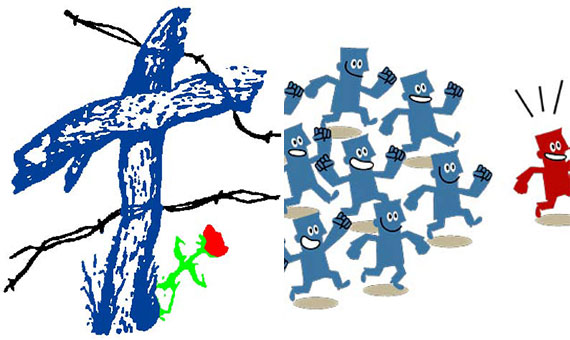Azadi ka Amrit Mahotsav Kolkata event honours four Clergymen
Pope Francis asks businesses to support working women: They’re ‘afraid to get pregnant’
Study: Christianity may lose majority, plurality status in U.S. by 2070
Indian politician declines Magsaysay Award under party pressure
Like John Paul II, Pope Francis heads to Kazakhstan during time of war

245 Million Christians Living In the Top 50 Countries
Suffer High Levels of Persecution

Dr. Keith D Souza S.J., Mumbai
Why do you think Christians are persecuted all over the world?
One of the crucial reasons for such a drastic and harmful development is that some of the materially advanced parts of the world have undergone a secular change. In such a scenario, which is post-religious, majority of religions are viewed with a condescending eye. However, people holding their faith in Christ attempt to work with legitimate governments having its core in people’s agenda. Despite such associations, some governments can be hostile to the needs and concerns of the citizens. I am personally of the opinion that this hostile relationship is what leads to the persecution of Christians worldwide.
Do you believe that the idea of the West being predominantly Christian aggravates this animosity towards Christians?
It can be understood that the presence of radical and right winged religious movements, like ISIS, consider their marginalisation to be a religious one. When such discrimination is inflicted on their minds, they find it necessary to attack nations to exert their power. Also, they are unable to distinguish between religion, culture and nation. Therefore, their religious lens zooms in on the West, which is Christian, unaware of the fact that it is actually post-Christian in nature. However, the rigid and strict security measures prevalent in the West prevent such outbursts. The Easter atrocity in Sri Lanka may not have been possible in Europe. They are able to target areas that are vulnerable and are related to Christian faith.
Was it the Christian culture of Europe that led to a cry in the streets of Paris when the historically significant Notre- Dame caught fire?
The French Revolution, rooted in the three values of liberty, equality and fraternity, has its centre on the teachings of the Gospel. Similarly, the traditions pertaining to Europe at that time chronicles a Christian ethos. Despite its significance, the church may not have paid attention to this Christian shading, rather they must have opposed the political and religious hierarchy as they did not respect the three pillars of the French Revolution. Moreover, Christianity has evolved into the principles of Europe in terms of its legal infrastructure, thereby into the culture of the continent. This does not necessarily imply that the spiritual and moral ethics of the people are Christian. Their way of life, revolving primarily around their legal, civic and social norms, have been Christianised. However, such associations do not indicate the complete Christianisation of international relations. Countries like Germany are open to immigrants and rescuing refugees and strangers, exhibiting a form of Christian hospitality, highlighted even in the Old Testament.
Do you think that Christianity in Europe is converting itself into one based on humanism?
Yes, but this Christianity is a form of redeemed humanism, not a secular humanism. I feel that the necessity to recognise the binary distinction between secular and religious is no longer valid. This notion falls in line with Derrida’s concept of secular as religious. Accepting this negation of differences gives rise to a humanism that pertains to a Christian ethos. In this way, Europe values Christian beliefs.
Wouldn’t this be considered as an uprising of religionless Christianity as put forth by Dietrich Bonheoffer?
True, but this significantly represents a spiritual Christianity in comparison to a religionless Christianity. The Christianity propagated by Christ did not pay attention to the nation state whose matrix is merely five hundred years old. The idea of spirituality is definitely beyond that and is of greater importance. This indicates how He wanted to usher in the same values of the type of French Revolution, of liberty, equality and fraternity. However, I do not consider this advancement to be an accident but rather, the glory of the Holy Spirit. It is the work of the Spirit that has empowered the laity to save themselves and others as they represent mankind. They are symbolic of an opposition of power positions and secular, political and ecclesiastical viewpoints.
Wouldn’t this suggest that Christianity has found itself in a dangerous position created by hierarchical structures?
I would like to answer this through a very unpretentious question. What would be Jesus’s opinion with respect to hierarchy? It is evident that He would not look up to people who are influential nor would He degrade the lesser important people with His preying eyes. What is crucial is human dignity, especially when you give hierarchy a role of service. It would not be a role of power and domination that would be condemned by Jesus. They are simply service roles under the tag of hierarchical positions, namely that of the Church hierarchy and secular hierarchy.
Leave a Comment